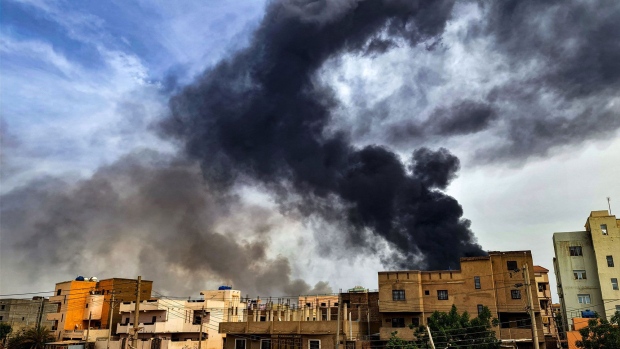Oct 26, 2023
Iran-Sudan Rapprochement Threatens to Deepen Deadly Civil War
, Bloomberg News

(Bloomberg) -- Iran is quietly rebuilding ties with Sudan, stoking concern the Islamic Republic will widen its military influence on the fringes of the Middle East and deepen a disastrous civil war.
With cease-fire talks for Sudan’s six-month-old conflict set to resume Thursday in Saudi Arabia, Tehran’s recent rapprochement with the North African nation’s army throws a potential wildcard into a crisis already vulnerable to outside interference.
Western powers are concerned a return of Sudan-Iran cooperation after a roughly seven-year pause may see the Sudanese military receive Iranian weapons and expertise in its struggle against the rival Rapid Support Forces, according to foreign officials following the conflict.
The battle for control of Sudan, a resource-rich nation situated on the Red Sea near a choke-point for global shipping, has already killed more than 9,000 people and forced 5.6 million from their homes. Iran backs militant groups ranging from Hamas in Gaza to Lebanon’s Hezbollah and the Houthis in Yemen.
Read More: The World Backed Two Generals. Then Sudan Went to War
Deeper Iranian ties may also definitively end the US-backed prospect of Sudan fully normalizing relations with Israel, an initiative already derailed by the civil war, the people said. They requested anonymity as they aren’t allowed to comment publicly on the issue.
The reforging of relations, which includes a move to reopen embassies shuttered in 2016, come as Western powers try to stop the Israel-Hamas war from spilling over into other Middle Eastern countries, from Lebanon to Iraq, where Iran-aligned forces hold sway.
Read More: What’s Behind the Fighting in Sudan and What It Means: QuickTake
The US says it has held back-channel talks to warn Iran against escalating the conflict that erupted when Hamas attacked Israeli towns on Oct. 7, killing more than 1,400 people. Authorities in Hamas-run Gaza say Israel’s bombardments have killed thousands. Hamas is designated a terrorist group by the US and European Union.
‘Proxy Engagement’
European Union officials didn’t respond to a request for comment, nor did Iran’s foreign ministry. A US State Department spokesperson said it had “raised our concerns on this with contacts in Sudan’s military government.” The US and partners are united in urging parties to immediately end fighting in Sudan and for the army and RSF to respect international law and human rights and allow unhindered access to aid, the spokesperson said.
Among the worries, the people said, are that Iran may widen its drone program, which according to the US has already supplied Hezbollah, Hamas, Kata’ib Hezbollah in Iraq, the Houthis and Ethiopia’s army.
Sudanese military chief Abdel Fattah al-Burhan’s acting foreign minister in July met his Iranian counterpart at a Non-Aligned Movement meeting in Azerbaijan, where they agreed to rebuild relations and strengthen political and economic ties.
Iran and Sudan in 2007 signed a mutual defense agreement after which there were increased sales of Iranian missiles and drones to Khartoum, the Geneva-based Small Arms Survey said in a 2014 report. It cited evidence Iran had a significant role in Sudan’s weapons industry, using a major manufacturing facility in the African nation’s capital to produce armaments and as an onward supply hub.
The rapprochement with Iran leaves Sudan’s conflict “exposed to further proxy engagement that will likely only prolong the fighting and give both sides more oxygen to keep fighting,” said Hafsa Halawa, a Dubai-based non-resident scholar at the Middle East Institute.
Iran and Sudan were close for much of the past three decades, allied by a shared admiration for revolutionary Islam after President Omar al-Bashir seized power in 1989 and made the African country a pariah in the West. That changed around 2015, when Sudan tilted toward regional giant Saudi Arabia and sent troops to help fight against Yemen’s Houthis, putting it at odds with Iran.
After Bashir was ousted in a 2019 popular uprising, Sudan’s military-led transitional government rushed to rebuild ties with the West and salvage the economy. Most of that progress was destroyed when conflict erupted in April between Sudan’s military and the RSF militia, whose leaders have forged security ties with Israel in recent years.
Thursday’s talks in Jeddah will be mediated by the US, Saudi Arabia and the Intergovernmental Authority on Development, a bloc of East African nations including Kenya, Ethiopia and Uganda. Their goals are limited — a new temporary cease-fire and access for crucial humanitarian aid.
The chances of a deal are slim, according to Kholood Khair, a Sudanese political analyst.
“It’s now dry season and prosecuting this conflict on the battlefield now supersedes doing so at the negotiating table,” she said. Both warring parties “have decades of experience making such international mediations work for them — buying time while they continue to wage war and generally run circles around mediators.”
©2023 Bloomberg L.P.


